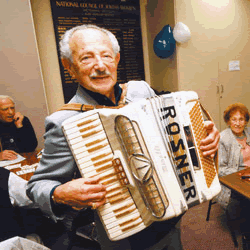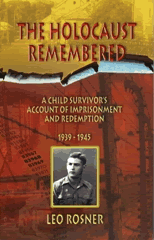LEOPOLD ROSNER
By Anna Rosner Blay
MUSICIAN
26-6-1918 — 10-10-2008


LEO Rosner, whose musical skill saved him from becoming a Holocaust statistic, thanks to the intervention of Oskar Schindler, has died at an aged care home in Caulfield after entertaining Melburnians for 60 years. He was 90.
During World War II, Leo and his wife Helen were among more than 1200 Jews saved from near certain death by Schindler, a German industrialist.
Schindler happened to be a guest one evening at the Plaszow concentration camp, when he heard Leo and his brother Henry playing at a party organised by the camp commander Amon Goeth. He liked the music so much he later added the names of Leo and his family to his now famous "list" of Jews he would save from the Nazi gas chambers.
For these parties, Leo and Henry would have to change from their camp uniforms into tuxedos provided by the Nazis to entertain their guests.
Born into a musical family in Krakow, Poland, Leo picked up music at an early age and soon began performing professionally with his father at Jewish functions. He also played music with his brothers across Poland.
When the German army invaded Poland in September 1939, the Rosner family moved from Krakow to Tyniece, a small rural town, where they played in barns for potatoes or flour. But soon they were rounded up and crammed into the Krakow ghetto, where they lived with four other families in one apartment. Leo continued to play music with Henry at Polonia, one of the ghetto's cafes, where he met his future wife, Helen. They were married on January 17, 1943, but on his wedding night Leo was taken to Plaszow concentration camp, alone. Helen was deported to the camp eight weeks later.
Leo always felt that the musical reputation he shared with Henry more than once saved their lives even before Schindler's intervention.
Eventually Leo and Helen were reunited in Schindler's ammunition factory in Brinnlitz, Czechoslovakia. After the war, they joined Henry in Munich and met up again with Schindler who, with his Jewish girlfriend, stayed in their apartment. Leo and Helen then moved to Paris, where he played in nightclubs, featured on Radio Paris with such stars as Maurice Chevalier and Mistinguette, and played on stage with Django Reinhardt. Three years later the Rosners moved again — this time to Melbourne.
When they arrived in Australia in 1949, Leo didn't know a word of English; his communication medium was music. He was introduced to and impressed the dance band leader Denis Farrington, and was soon carving out a niche in the music community with his broad repertoire of songs on his personalised piano accordion. One of his earliest performances was on Radio Auditions on 3UZ, where he achieved the rare reward of four gongs!
For recent immigrants from Europe, his music became a link with the lifestyles from which they had been brutally separated. It provided the soundtrack for people rebuilding after the war and celebrating the gift of life, birth and renewal. Through the inclusion of songs such as Waltzing Matilda and footy club themes in his repertoire, Leo embraced this new homeland.
In the 1950s, he played accordion and double bass at some of Melbourne's best known cabarets, including such venues as the New Empire Ballroom, Troika, Oran, Katarina, Eden, and Pacific.
He recorded his first two albums on the W&G label, his Jewish Pot Pourri (1956) and International Medley (1957). In the 1960s and '70s, he opened his own venues — the Moulin Rouge nightclub in St Kilda and then Dayan Receptions in Elsternwick. Weddings, bar mitzvahs, engagements, birthdays and parties were all celebrated to the music he played.
Leo figured prominently in Tom Keneally's 1982 book, Schindler's Ark, and featured in the epilogue of Steven Spielberg's film, Schindler's List. The exposure meant he was in constant demand, and he willingly shared his Holocaust experiences, his music and his life story.
Leo always gave generously of his music and his time to a wide variety of groups, both Jewish and non-Jewish. He played for no fee at numerous fundraising events and for entertainment. He also spoke at more than 100 schools, as well as church groups and community organisations, and was an active volunteer at the Melbourne Holocaust Museum and Research Centre.
In 2000, Leo performed at a cabaret concert and produced a CD, Leo Rosner Cabaret, in aid of Jewish Community Services. He continued to play well into his 80s at bar mitzvahs and family weddings. To the end he inspired all who knew him. Strongly ethical, he made uncomplicated choices to do what was right and honest.
And despite his war experiences, he harboured no bitterness towards Germans — he always sought to see the good in people whatever their nationality, race or religion.
The last survivor of nine brothers and sisters, Leo is survived by his wife Helen, daughters Anna and Frances, six grandchildren and six great-grandchildren.
Anna Rosner Blay is Leo Rosner's daughter.
Read more: http://www.theage.com.au/national/a-hit-on-schindlers-music-list-20081202-6pt8.html?page=-1#ixzz1KGESAgGB